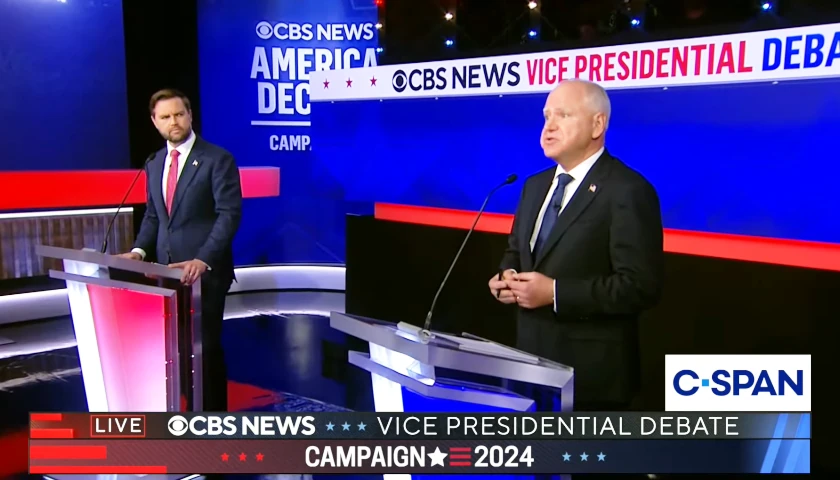Live from Music Row Wednesday morning on The Tennessee Star Report with Michael Patrick Leahy – broadcast on Nashville’s Talk Radio 98.3 and 1510 WLAC weekdays from 5:00 a.m. to 8:00 a.m. – host Leahy welcomed the original all-star panelist Crom Carmichael to the studio to weigh in on the recent Rasmussen poll regarding systemic racism and other topics regarding Critical Race Theory and state secession.
Leahy: In studio, as we almost always are, every Monday, Wednesday, and Friday at this time by the original all-star panelist Crom Carmichael. Crom, good morning.
Carmichael: Good morning, Michael.
Leahy: Well, it was an interesting morning for me because it started out at 3:50 a.m. in the morning. I sit down and I collect all of our information about our guests and our audio clips, and I put them together and in a show clock.
And at typically about 4:20 a.m. and I email that show clock to Scooter and our booking producer. And so he’s got the show clock for how we’re going to do the show and what clips we may or may not play.
So usually it goes out at 4:20 a.m. At 4:17 this morning, my Internet went down. I have a preliminary show clock that I get that our booking producer puts together. And so I just forwarded that to Scooter and we were able to put together a show clock so that it’s seamless.
Scooter: Crom, the truth is, we’re winging it. We’re just winging it.
Carmichael: So now we’re on to find out whether the show clock matters. (Laughter)
Leahy: (Laughs) That’s very good.
Carmichael: Well, we’ll see. Do you want it to matter?
Leahy: It matters in my mind and I already composed it.
Carmichael: I can stumble and bumble my way through the show and I could say if I just had that show clock.
Leahy: I usually print it out, give it to you sometimes. So we’re moving on. A little more than you need to know about the behind-the-scenes of how this great enterprise is held every day. Crom, Monday when you were in, I shared with you a stunning poll from Scott Rasmussen.
A very good guy. Good pollster. And I’m going to read it and then just get your reaction to it because it says a lot about America. Scott said because he sends me this email every day, just personally to me.
Not to the thousands of people on this list. His latest polling release shows that voters nationwide believe that just about every major problem in America results from racial discrimination.
28 percent nationwide. 56 percent disagree. 16 percent are not sure. What’s important about this Crom is the breakdown demographically. 56 percent of Hispanic voters see racism as the core issue in just about every major problem.
65 percent of White voters disagree. Black voters are evenly divided. 42 percent see racial discrimination underlying the nation’s problems. While 38 percent do not. But this is kind of the big point here.
There is a massive generation gap on this topic. Among the youngest voters, those under 25, nearly half 47 percent see racism at the root of major problems. Only 34 percent disagree. And among those 25 to 44, 35 percent say racial discrimination creates most major problems.
46 percent do not. But among those over 45, two-thirds, 66 percent of voters reject the idea that just about every problem in America results from racial discrimination. My question for you, Crom is systemic racism has been outlawed in America since 1970.
And those of us who are over 45 would say it’s not an issue. But the young kids who really have not experienced anything like the 60s and 50s and 40s generation’s did, a plurality of them see racism as the root of our major problems of the country. What do you make of that?
Carmichael: Well, the interesting part would be the breakdown because they don’t do it. He does a nice job of breaking it down, breaking these categories down by race in the total where he says 56 percent of Hispanics.
So if you get to the younger parts of the nearly half or 47 percent, the question would be, for me, is what percentage of the Hispanics are under 25? What percentage of the Black population under 25?
What percentage of Indian and Asian? Because if you’re Asian, you can very well think racism is a big problem because you’re being affected by it because you’re being held to a completely different standard than even White people. You’re discriminated against.
Leahy: If you’re trying to get into Harvard.
Carmichael: Forget Harvard. If you’re trying to get into any school, any state school in California, and even in New York City in high school, they’re now discriminating against Asian students. They want to shut down the AP classes all across New York City because they’re dominated by Asian students.
Leahy: Because they perform better.
Carmichael: They perform better. And so when you say racism, it all depends on what you mean by the word racism, because if you’re an Asian, you could see it completely the opposite.
Leahy: Shouldn’t we celebrate superior academic performance regardless of race, color, or creed?
Carmichael: I think you should celebrate merit in anything.
Leahy: You should.
Carmichael: I mean, you have the AMA that actually came out now with a new policy that merit doesn’t matter. And I can’t think of a profession where merit should not matter more than in medicine.
Leahy: If somebody is going to, I don’t know, perform surgery on you, you want to make sure they’re pretty good at it.
Carmichael: You want a brain surgeon that knows how to do it. The thing that’s just really disturbing about that is that all the members of the AMA who voted to do away with meritocracy, if they or their family members need it they will go to the best surgeons and they’ll find them, and they know who they are.
So that’s who they’ll go. And they’ll leave everybody else to just fend for themselves. This is kind of what’s happening now in so many different areas. Look what’s happening with Critical Race Theory across the country. You have in Tennessee, the state legislature that has outlawed Critical Race Theory, the teaching of it.
Leahy: And Governor Lee just signed that bill into law yesterday.
Carmichael: So now, as a matter of law in Tennessee, you can’t teach Critical Race Theory, (i.e. racism and Marxism). Racism as a problem. Marxism is a solution. That’s Critical Race Theory in a bottle.
Leahy: Yes, but here’s the little asterisk to that. That law, which identifies 14 tenants of Critical Race Theory that cannot be taught in public schools. The enforcement mechanism basically is left to the Commissioner of Education Penny Schwinn.
The city of Memphis said, well, we’re going to teach it anyways, and the Shelby County schools are likely to teach it anyways. So when a complaint comes, the adjudication of that complaint, the enforcement of that company is going to go to Commissioner Schwinn.
The enforcement mechanism is to withhold state funds from Shelby County schools if they do that, which I expect they will do. A lot of people, a lot of people are fearful that Penny Schwinn will not enforce the law.
Carmichael: Well if they don’t, then the legislature will likely come back next year and it will change the law so that people who break the law can be held personally liable. And that would be the solution to it.
Then parents can sue the individual teachers and the boards of education, and that’ll shut it down. But here’s the big point here. You have now 20 states across the country that have passed similar legislation.
You have at least a dozen states across the country that are teaching Critical Race Theory. Virtually every place you can is going to be a requirement.
Leahy: In the state of Washington, they’re requiring the teaching of Critical Race Theory.
Carmichael: Okay. So you are going to have this in these blue states, and then you’re going to have places in Washington, for example. Washington state is really two states. And I’m actually disappointed that the people in Oregon, in the counties that are that don’t ascribe to the values of Portland, they voted to secede.
Leahy: And join Idaho.
Carmichael: I think they should secede and form their own state.
Leahy: By the way, that movement, the greater Idaho movement. There are counties in Eastern Washington that are going to have the vote, too.
Carmichael: Well, but I want them to have their own state. They should be represented by two senators and a House member.
Leahy: Do you understand the problem with that politically, is that it is easier for a county to leave a state and join an existing state than it is to form a new state. That’s their argument.
Carmichael: I think they need to have their own state. I think there are a lot of places. I think Southern Illinois.
Leahy: And upstate New York, where I’m from.
Carmichael: And upstate New York. I can come up with at least 10 additional states. And then I’m seeing 20 senators here. 20 senators who will stand up for the values and who will then represent the people that voted them in.
Listen to the second hour here:
– – –
Tune in weekdays from 5:00 – 8:00 a.m. to the Tennessee Star Report with Michael Patrick Leahy on Talk Radio 98.3 FM WLAC 1510. Listen online at iHeart Radio.





